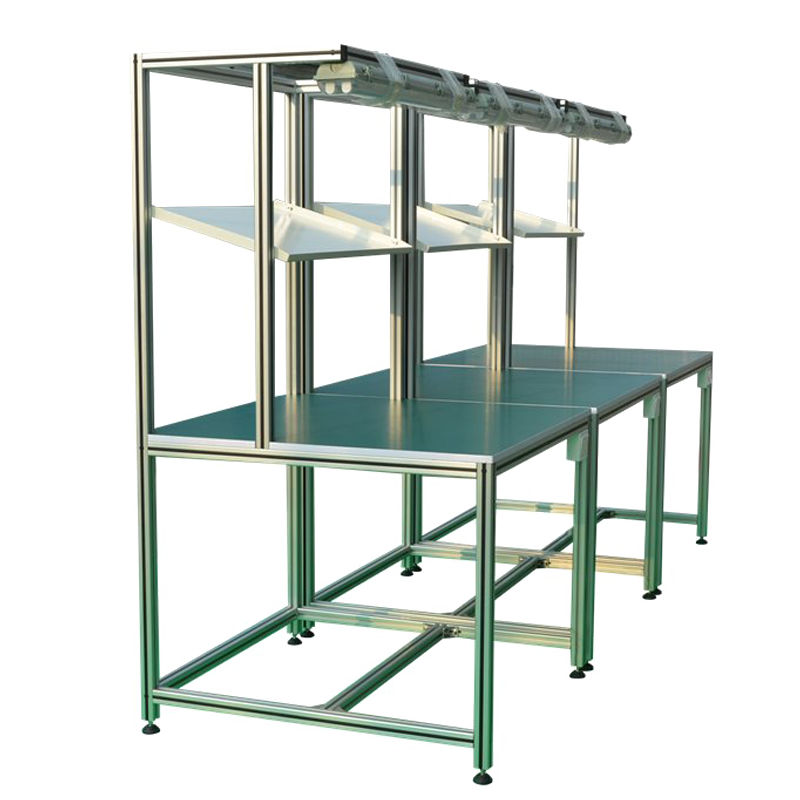Characterized by its T slotted aluminum extrusions, this workbench makes for easy assembly and customization, allowing for an array of attachments and configurations. Its durable construction ensures it can withstand rigorous use.
Beschreibung
T Slot Aluminum Workbench

The aluminum profile workbenches are a workstation with an industrial aluminum profile as the main support structure and other panels and two supports. Aluminum profile workbench, we also call aluminum profile operating table, workstation worktable, anti-static workbench. usw
Therefore, people use this kind of workbench mostly in various production and processing workshops.
So the specifications are diverse and the styles are numerous. Therefore, it can meet various usage requirements and has beautiful appearance; people can assemble and manufacture the laminates bear heavy loads according to customer needs. Außerdem, it saves space and has strong applicability. It has good corrosion resistance, dirt resistance, impact resistance and strong load-bearing capacity.
The desktop has been specially treated and has the characteristics of anti-corrosion and strong impact resistance. A variety of desktop options can meet different usage requirements. Therefore, we can use it widely. Such as in factories, exhibitions, offices, Lagerung, displays, industrial applications, anti-static workshops, usw., hospitals, clean rooms, kitchen engineering supporting facilities, usw.
Advantages & Disadvantages
The aluminum profile workbench represents an innovative addition to the category of workbenches, crafted from a high-strength aluminum alloy. This bench boasts a well-considered design, aesthetic appeal, and sleek finish, along with the benefits of being light weight, robust, and long lasting.
Advantages:
1. Its light weight surpasses other materials of comparable size, offering exceptional strength that exceeds that of ordinary glass. Exhibits excellent resistance to corrosion.
2. The workbench’s surface undergoes an electrophoresis treatment, reducing the dust and oil adherence, which makes maintenance a breeze.
3. Highly malleable, it can be easily shaped and reconfigured, allowing for a wide variety of design possibilities
4. The coloring is consistently vibrant and the finish is smooth, free from any unsightly marks or blemishes.
5. A fire-resistant board is incorporated, capable of withstanding extreme heat up to 1300 degrees Celsius.
Shortcomings:
1. The choice of materials for the workbench surface limits its use for heavy-duty tasks: but under excessive weight. It may suffer from deformation
due to limited load-bearing capacity.
2. There is a lack of environmental adaptability.
3. In conditions of high humidity, there’s an increased potential for rust.
4. Incorrect handling may result in the peeling of the paint coat.
Utilizing Aluminum Profile Workbenches in Automated Production Lines:
Supporting Equipment Platforms: Aluminum profile workbenches serve as excellent equipment supports within automated production environments. Their capacity for customization means they can adapt to support devices of varying shapes, sizes, and weights, ensuring equipment operates normally while enhancing the overall stability and safety of the production line.
Facilitating Material Transfer and Precision Positioning: Central to automated production are the transfer and accurate positioning of materials. Außerdem, aluminum profile workbenches can be seamlessly integrated with mechanisms like conveyor belts and slide rails to automate these processes.
Thorughtfuly arranged and designed, these workbenches facilitate uninterrupted material movement, minimize the need for human intervention.
and bolster productivity.
Modularity and swift reconfiguration:The modular nature of aluminum profile workbenches allows for rapid reconfiguration to meet the evolving demands of production. So simple disassembly and reassembly provide a quick turnaround when updating or changing machinery,
significantly cutting down on production time and costs, and enhancing the line’s flexibility and scalability.
Benefits of Integrating Aluminum Profile Workbenches with Automated Lines:
Boosting Productivity: Merging aluminum profile workbenches with automated lines leads to more stable and efficient machinery operation. Streamlining material movement and positioning processes means fewer hands-on tasks and higher production speeds. The workbenches’ modularity also makes it a breeze to adapt to new products and production requirements, propelling productivity forward.
Enhancing Product Quality:The robustness and resistance to corrosion characteristic of aluminum profile workbenches contribute to more reliable equipment performance. This reliability reduces potential equipment failures and associated downtime, augmenting the quality and consistency of products.
Zusätzlich, the precision positioning capabilities of these workbenches ensure high accuracy in product manufacturing
Cutting Manufacturing Costs: Thanks to their modular design and ease of adaptation, aluminum profile workbenches simplify and expedite production line adjustments and maintenance. So this efficiency can lead to reduce labor and manufacturing costs, bolstering the competitive edge of businesses.
Außerdem, the durability and longevity of these workbenches, aided by their resistance to corrosion, lead to more significant savings in the long term by prolonging equipment life.
Key Points in the Design
Außerdem, aluminum profile workbenches offer exceptional customization flexibility. Should any adjustments become necessary during operations you can easily perform modifications without incurring the expenses associated with re-customization.
These workbenches have become essential for modern manufacturers, prominently featured across production facilities in diverse configurations. Außerdem, each style of aluminum profile workbench adheres to specific design criteria to meet a range of manufacturing needs.
There are two common styles of workbenches: They are upright workbench and sitting workbench.
1. Key points in the design of upright workbench: The workbench should be designed with enough space to facilitate the placement of tool racks and material boxes. Gleichzeitig, the designer should consider future adjustments and make the height of the workbench adjustable.
2. Key points in the design of a sitting workbench,
High-precision workbench, height=790-940mm.
The height of the workbench used for reading or writing is 710-790mm.
The height of the workbench for typing or simple assembly is 530-710mm.
Zusammenfassend, no matter what style of workbench it is, it must be designed to comply with ergonomics. So that during use, fatigue will be reduced and work efficiency improved. So it will enable employees to change their working position and posture to improve workplace health and safety.





